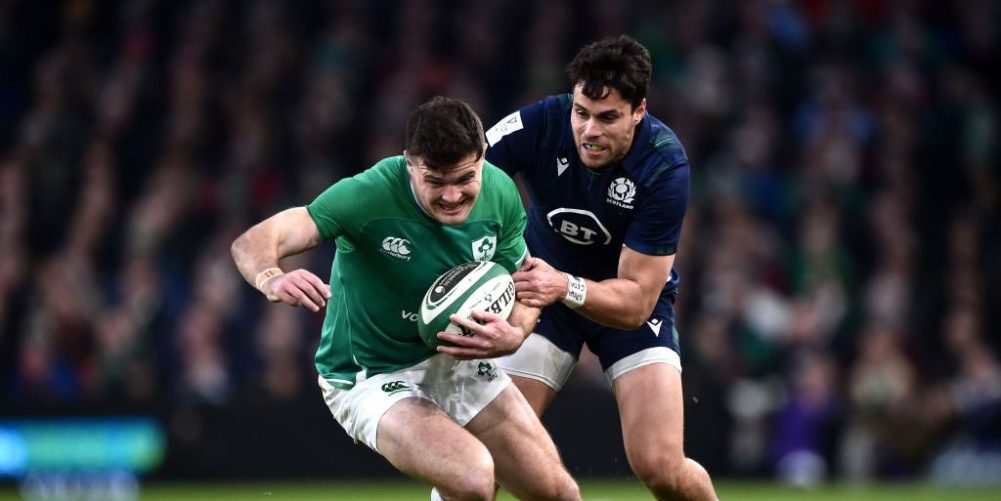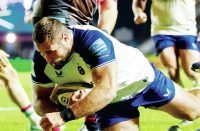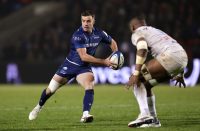The entire cast for the 1990 Five Nations, brought to a thunderous climax by Scotland‘s slow walk to the Grand Slam, included one solitary New Zealander.
Sean Lineen had every ancestral right to line up behind David Sole at Murrayfield in readiness for their famous ambush of England‘s supposedly unbeatable team. In the ecstatic aftermath of a weekend in Auld Reekie like no other, it did not occur to Scotland’s long-distance centre that he was about to set a global trend.
Thirty years on and still serving the Scottish game as head of their national academies and head coach of the U20’s, Lineen can see now that what he started in the last years of amateurism has become a big deal, one that gets bigger with every year.
Since the creation of the Six Nations 20 years ago, some 60 New Zealanders have followed the Lineen Trail in search of an alternative international career. The latest, Johnny McNicholl, duly took up position on the right wing for Wales yesterday having qualified under the residential rule.
In 1990, by which time Lineen had reversed the journey his grandfather had made from the old world to the new during the first half of the 20th century, the Championship rolled along on the usual clearly defined lines of allegiance. The blurring of the boundaries were about to begin, not that anyone could see it at the time.
Lineen may have been out of his own but the substitutes, supposedly to be used not for tactical changes but to replace injured team-mates, did include a largely invisible South African representing France. Eric Melville, sighted very briefly towards the end of a home win over Ireland, came from the same trail-blazing mould.
Nobody, least of all Eric, could have imagined that one day two South Africans would be locking the scrum for France. That will come to pass today when Bernard Le Roux from the Western Cape and Paul Willemse, an old boy of Mounument High School in Krugersdorp, join forces against England in Paris.
If only Melville had lived to see it. He died suddenly, in his adopted Toulon from a heart attack at 55, in 2017 but not before a host of would-be Springboks made it into the great annual tournament with every member of the Six.
New Zealanders continue to make the biggest impact. As a shrinking landscape makes rugby ever more of a global village, Kiwis will be seen in coming weeks in white, red, green and all three shades of blue.
PETER JACKSON
Six Nations’ Kiwis (current players):
15. Jayden Hayward (Italy)
14. Johnny McNicholl (Wales)
13. Virimi Vakatawa (France)
12. Hadleigh Parkes (Wales)
11. Sean Maitland (Scotland)
10. Gareth Anscombe (Wales)
9. Willi Heinz (England)
1. Mako Vunipola (England)
2. Dylan Hartley (England)
3.Simon Berghan (Scotland)
4. Brad Shields (England)
5. Dean Budd (Italy)
6. Sean Reidy (Ireland)
7. Teimana Harrison (England)
8. Blade Thomson (Scotland)
Six Nations’ Kiwis (Past and present)
15. Mark van Gisbergen (England), Matt Cardey (Wales), Brendan Laney (Scotland).
14. Lesley Vainikolo (Eng), Kaine Robertson (Italy)
13. Jared Payne, Mike Mullins (both Ireland), John Leslie (Scotland), Tony Marsh (France)
12. Bundee Aki (Ireland), Riki Flutey (England), Sonny Parker (Wales), Ben Te’o, Shontayne Hape (both England)
11. Denny Solomona (Eng), Shaun Longstaff (Scot)
10. Joey Carbery (Ireland), Henry Paul (England), Shane Howarth (Wales), Kelly Haimona, Rima Wakarua (both Italy), Phil Burleigh (Scotland)
9. Isaac Boss (Ireland), Sam Pinder, Grayson Hart (both Scotland), Paul Griffen (Italy).
1. Michael Bent, Rodney Ah You (both Ireland)
2. Ross Nesdale (Ireland)
3. Perry Freshwater (Eng), Nathan White (Ireland)
4. Legi Matiu (France)
5. Matt Mustchin (Scotland)
6. Blair Cowan (Scotland),
7. John Hardie, Martin Leslie, Hugh Blake (all Scotland), Brett Sinkinson (Wales), Josh Sole (Italy)
8. Thomas Waldrom (England), Scott Palmer, Matthew Phillips (both Italy).
Six Nations South Africans (mainly present)
15. Scott Spedding (France)
14. Byron McGuigan (Scotland)
13. Stuart Abbott (England)
12. Brad Barritt (England)
11. Nick Abendanon (England)
10. Greig Tonks (Scotland)
9. Rory Kockott (France)
1. Allan Dell (Scotland)
2. Richardt Strauss (Ireland)
3. Willem Nel (Scotland)
4. Bernard Le Roux (France)
5. Paul Willemse (France)
6. Braam Steyn (Italy)
7. Cornell du Preez (Scotland)
8. CJ Stander (Ireland)























